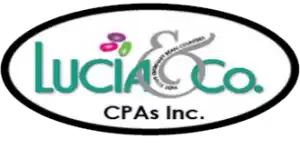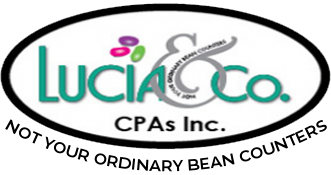One of the most common questions we get here at Lucia CPA is “Can I deduct this?” This is a perfect question and you shouldn’t be afraid to ask this ever. As a small business owner, you work hard yearlong to get every penny you can and it’s only fair you receive every deduction you’ve earned. That’s why we’re here to help.
In most cases, the answer to this common question is yes! A lot of expenses that you put towards growing and developing your business are tax deductible. Not every single one will count, but there are so many that it can be hard to keep track and may cause you to forget an expense that’s easily deductible.
We’re going to break down a whole list of small business tax deductions you need to consider when filing your taxes. We’ll walk through most of applicable expenses in Schedule C (sole proprietors) and Form 1120 (corporations), as well as some typical costs that fall underneath each of them.
First and foremost, we strongly recommend separating your business and personal banking accounts from each other. When it comes to tax time, you can easily look back at your receipts and bank statements and identify deductions without having to separate your personal expenses from your business, saving you time and energy. Make sure to utilize popular bookkeeping software like QuickBooks to track your expenses throughout the year.
Advertising
We’re sure you’ve put time, money and effort into advertising. After all, there’s little chance your business will succeed without promoting your business through one form or another. Not surprisingly these expenses can add up fast, but you can deduct all of it in full so long as you keep track of it all.
Here’s a few expenses that fall into this category for small business owners:
- Billboards
- Business Cards, Flyers, Postcards
- Company Swag (Shirts, Hats, Jackets, etc.)
- Email Marketing (MailChimp, Constant Contact)
- Google AdWords, Facebook Ads, Yelp Promotions
- Physical or Digital Ad Publications
- Sponsored Content / Events
- Vehicle Wrap Promoting Your Business
- Website Development / Maintenance
Automotive Expenses
Don’t skip on deductions for using your car or any personal vehicle for business related purposes. By keeping track of each individual expense, you can tally a nice deduction for gas, maintenance and even depreciation. On the other hand, you can just take the IRS’ standard mileage deduction which is 58¢ per mile in 2019 (54.5¢ in 2018).
Whether you choose to itemize your automotive expenses or take the standard deduction, in either case you will have to track your miles accurately. There are plenty of apps on the Apple Store and Google Play including Stride Tax, Hurdlr and MileIQ that are perfect for tracking your mileage throughout the year. Keep in mind, you can only count miles relative to business travel – a business trip, delivery, meetings with clients and investors – not including your normal trip to and from your home and place of work. Don’t forget to include any tolls and parking fees you accrue due to business travel as you can deduct a percentage of those costs.
Lastly, if you purchased a vehicle solely to use for your business (i.e. delivery truck), you can depreciate the cost over it over its expected lifetime. We’ll take more about depreciation in its section below.
Charitable Contributions
If you’re the owner of a C-Corp and donate money, supplies or property to a reputable charity you will be able to deduct it off your expenses. This doesn’t include time and you cannot deduct more than 10% of your income as charitable contributions per year. Make sure that the charity you’re donating to qualifies for this deduction with the IRS, don’t just assume it does and expect to win an argument over it with the IRS when tax season rolls around.
As a sole proprietor, LLC acting as a sole proprietor or an S-Corp, you won’t be able to take advantage of this deduction, but you can write it off on your personal taxes if you itemize your deductions.
Commissions / Fees
Chances are you don’t do everything around your business. You have someone else or a third-party help you sell your product or service. Anything you pay to another body to help complete everyday business tasks qualifies for a tax write-off. This includes:
- Bank Fees
- Commissions Paid to Salespeople
- Fees for Credit Card Processing and PayPal Payments
- Merchant Processing Fees – Etsy, Patreon, etc.
- Third-Party Marketing
Contract Labor
Understand that contractors and full-time employees don’t fall under the same category. Contractors and/or consultants are individuals you hire throughout the year to work on a certain task or project, they are not employed to your business. As such, the cost of paying them is tax deductible. Some of the most common contract labors we see include:
- Business Coaches
- Consultants
- Freelance Workers
- Seasonal Hires
- Second Shooters
- Virtual Assistants
These are just a few of the many contract labors out there but are far the most common. When tax time rolls around, make sure you file a 1099 for anyone you pay over $600 that year.
Depreciation / Amortization
Buying expensive pieces of equipment or purchasing large assets for your business can be quite costly. Fortunately, you can write these costs off. For physical assets, we call this depreciation while intangible assets fall under amortization. Any physical product or asset purchase is deductible through installments over its expected lifetime, including anything costing over $2500.
On top of this, you can file the full cost of qualified business property under Section 179, so long as you started using it during the past year. This includes everyday items like computers, furniture and vehicles. Make sure you take full advantage of this for a maximum write-off. Some other common expenses include:
- Copyrights / Patents / Trademarks
- Cameras / Photo Equipment
- Customer Lists
- Licensing Agreements
- Product Equipment
- Website Domains
- Service Contracts
Employee Benefits
Most small businesses don’t have to worry too much about this, but if you offer benefits to your employees you are able to write them off come tax time. This includes items like healthcare and retirement plans, as well as:
- Advance in Education
- Awards / Bonuses
- Dependent Care Support
- Life Insurance
- Pension
If you’re business is at the point where you’re offering these benefits to your employees, congrats. Deducting these businesses may require some help, lucky for you there’s an accountant waiting to help you.
Home Office
Setting up your work at home can save you money renting out/owning an office space elsewhere. It can range anywhere from a desk in the corner of your room to a garage purposed for your work. Either way, you can deduct a portion of your home costs as a business expense.
There’s two ways to take advantage of this deduction. The easier way is to use the simplified deduction from the IRS – multiply the square footage of your home used as a business space by $5 to see your deduction amount. Or, you can calculate the percentage of your home used for business purposes and then take that percentage out of your home costs (including rent/mortgage, utilities, insurance and repairs).
Insurances
You can write off the cost of premiums for business liability insurance and event insurances right away. Car insurance for business vehicles also falls under this umbrella, provided their use is solely for business purposes. This doesn’t include health insurance you offer to your employees. If you’re self-employed and want a deduction for your own health insurance, make sure you handle it on your personal tax return, not your business one.
Interest
Setting up a separate business account from your personal ones is extremely important, as you’re able to write off any interest you accrue on business credit cards and other forms of credit specifically available for business purposes. If you use a credit card for both personal and business expenses, you won’t be able to take advantage of this deduction.
—
As a small business owner, these deductions are important to know about in order to get the most back on your tax return. Here at Lucia CPA, we want to make sure that happens. Beyond telling you about these deductions every small business owner should take advantage of, let our team of friendly CPAs help you get through the tax season and get you back every penny you’ve earned the past year. Give us a call today at (800) 614-0139 or contact us online to set up an appointment with one of our awesome team members.
This is just part one of our ultimate guide to tax deductions for small business owners. Check back with us to see the part two when it’s available!


